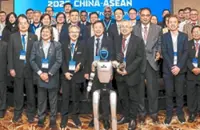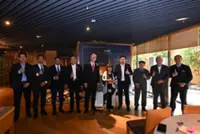APU is equipped with world-class infrastructures that allow students to gain hands-on experience, and exposure to real-time data and scenarios – to emerge as competent technology professionals under a real-world environment.
AS we cross the threshold of a brand new year, we are hurtling fast towards a future that increasingly resembles those depicted in sci-fi movies, with worlds that are increasingly enriched with integrated advanced technology in everyday lives.
Already many of these imagined technologies have already made headway within this decade – cars today are equipped with sensors that assist in driving and we have access to vast amounts of data, right on hand-held devices.
An accumulation of an ongoing tide of industrial revolutions going back to the invention of steam machinery in 18th century Britain, today’s Industrial Revolution 4.0 (IR4.0) is “blurring the distinction among physical, digital and biological spaces, ” as mentioned in the Ministry of International Trade and Industry’s (MITI) national policy called “Industry4WRD”.
The new revolution is set to change how products will be designed, made, used and operated. Maintaining and servicing these new products will also evolve, affecting how operations, processes, supply chain management and energy footprints in factories are utilised.
Nine Strong Pillars
Most industries worldwide look to the Boston Consulting Group’s (BCG) delineation of nine areas that will be affected by IR4.0. These include the processing of big data, the further advancement of artificial intelligence (AI) and robotics, increasing use of simulations.
Aided by use of cloud technology, technology will be more horizontally and vertically integrated, enabling Internet of Things (IoT), additive manufacturing, integration of augmented reality and cyber security to police against abuse.
While sweeping changes transform industries worldwide, IR4.0 should ultimately be instilled in those who will be affected – the country’s future crop of graduates coming out of the various academic institutions.
Ready for the future
At the forefront of this new wave, is one of Malaysia’s premier private universities, Asia Pacific University of Technology & Innovation (APU). It concentrates on providing a unique fusion of technology, innovation and creativity in preparing graduates for significant roles in business and society globally.
APU innovates by reviewing, developing and delivering programmes that are versatile, current and future-proof. By aligning its framework according to the Nine Pillars, it prepares its students for the impending revolution, through programmes that pivot on technology.
The framework covers IoT, data science, cyber security, cloud computing, AI or intelligent systems, mechatronics, e-business, digital marketing, financial technology (fintech) and mobile technology.
The university also observes the policies outlined in MITI’s Industry4WRD. These key areas are also developed to address the need for talents to transform Malaysia’s Digital Economy. The Industry4WRD policies focus on developing and implementing the right technological infrastructure to allow industries to undergo seamless digital transformation processes.
As an education institution, teaching and learning infrastructure and facilities within APU provide students a comfortable ecosystem for development, where they also receive instruction on the Nine Pillars.
The university is equipped with world-class infrastructures from France, Singapore, Germany, the United Kingdom, among others that allow students to gain hands-on experience, and exposure to real-time data and scenarios – to emerge as competent technology professionals under a real-world environment.
Once such facility at APU is the Cyber Security Talent Zone (CSTZ), which is also Malaysia’s first integrated cyber security talent zone. It houses a military-grade real-time cyber security monitoring software at the full-fledged Cyber Threats Simulation and Response Centre and Security Operations Centre, where students gain real-life exposure and practical experience.
APU nurtures creativity and innovation through its discussion spaces, think tanks, incubation zones and Innovation Labs on its Technology Park Malaysia (TPM), Bukit Jalil campus – which provides an out-of-classroom environment for students.
While its research centres provide students fruits for thought in robotics engineering, IoT, data analytics, forensic and cyber security, business digitisation and innovation, entrepreneurship and leadership.
APU also provides professional transformation by providing platforms for students to formulate world-changing ideas and develop innovative solutions for complex problems faced by industries undergoing digital transformation.
Moulding Job-ready Individuals
One crucial element that can never be replaced by increased mechanisation is of course the human touch. This takes the form of soft skills that are always welcomed by customers in any industry, and hence are qualities that employers look out for.
Students who graduate with this added potential are deemed industry-ready by most employers as they leave their academic institutions. In fact, surveys show that employers value these soft skills, which include communication skills, problem-solving skills, openness to learn and to gain new knowledge.
Such qualities are inculcated at APU for these skills are constantly nurtured on a day-to-day basis.
In addition, the university’s campus environment is home to international students from over 120 countries, offering local students the chance to mingle with a global community.
This is important as events such as the celebration of various countries’ independence days, multicultural nights and other cultural celebrations help instill a global outlook in APU students, encouraging understanding and respect for other nationalities and moulding them as effective communicators in tomorrow’s global economy.
IR4.0 adoption and development also calls for deeper critical-thinking skills. So to complement its world-class facilities, APU developed innovative teaching and learning methods that produce graduates who can think critically, act innovatively and communicate ideas effectively.
APU nurtures creativity and innovation while encouraging cross-cultural communication, allowing students to be equipped with the necessary technical and soft skills to be highly employable.
Such international exposures ensure APU graduates are open to differences in opinions, and they are also well-trained to engage in global conversations, international strategies, and multicultural encounters. In essence, they become confident and are highly employable.
All APU students also go through industry-advised, strategically designed curriculums that stress on innovation and advanced digital technologies and automation, readying them for complex, dialectical opportunities once they graduate.
To ensure its graduates are professional and highly employable, APU builds students’ confidence through practical workplace skills within the curriculum. Eventually, once they graduate, they are workplace-ready – a fact that is demonstrated by its students who are professionally attired, even on-campus.
To-date, APU graduates have impressed over 10,000 industrial partners and potential employers, and over 40,000 alumni are employed globally in reputable multinational companies such as Accenture, HP, IBM, Huawei Technologies, Astro, Maybank, Standard Chartered and more.
Building the IR4.0 Workforce
A university plays an important role in future-proofing school leavers and transforming them into industry-ready graduates in collaboration with the industry.
Through APU’s industry-academia partnership with various companies, the university can identify, recognise and mitigate any risk that IR4.0 may pose for its graduates, ensuring they stay competitive against the tide of increasing automation and machines.
To do that, APU formalises ties with various key industry players, in a partnership that involves an entire ecosystem of academic content development and delivery.
This includes regular programme reviews, joint certification and open internship and job opportunities for APU students.
Some of APU’s significant industry partners include:
-
IBM, which APU collaborated with to deliver a series of technical workshops, technology talks, industry visits, and more. This received overwhelming participation from APU students. The university has so far produced over 200 students as IBM certified solution designers and application developers.
-
SAS, which endorses APU’s undergraduate and postgraduate level programmes in data science by providing tools and educational material support for learning and research purposes. All APU data science graduates receive a Joint Professional Certificate from SAS upon completion.
-
Microsoft, which has been an APU industrial partner for over two decades. APU is one of the frontier universities on the Microsoft Talent Development programme. APU students engage directly with Microsoft professionals through workshops and talk sessions and many of them also attained professional Microsoft certification, which allows for greater job prospects. APU has also received the Microsoft Azure Educator Grant Award.
APU students have also won national- and international-level competitions organised by major industry players, such as FAMELab, Intel-CREST Industry-University Challenge, NASA Space Apps Challenge, World Asian Business Case Competition, SAS FinTech Challenge and more.
Students at APU are fully-prepared to join the future global workforce with confidence, not just for their first jobs, but for lifelong careers.
References:
https://circuitdigest.com/article/what-is-industry-4-and-its-nine-technology-pillars#





